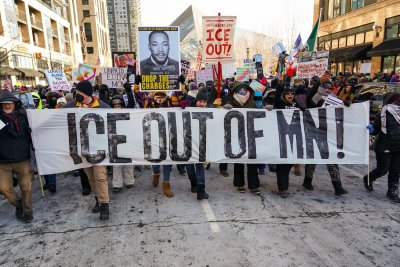US ends temporary protected status for Yemeni refugees, asylum seekers | Donald Trump News
Homeland Security Secretary Kristi Noem has determined it is safe for Yemenis to return to their country, despite ongoing conflict.
Published On 14 Feb 2026
The United States government has ended the Temporary Protected Status (TPS) designation for Yemen, ordering the more than 1,000 Yemeni refugees and asylum seekers living in the country to leave within 60 days or face arrest and deportation.
The action on Friday came as part of US President Donald Trump’s broad immigration crackdown, which is impacting those who fled perilous lives in war-torn countries.
Recommended Stories
list of 4 itemsend of list
It will terminate TPS for roughly 1,400 Yemeni nationals who have had access to the legal status since September 2015 because of armed conflict in their country, Secretary of Homeland Security Kristi Noem announced on Friday.
“After reviewing conditions in the country and consulting with appropriate US government agencies, I determined that Yemen no longer meets the law’s requirements to be designated for Temporary Protected Status,” Noem said in a statement.
“Allowing TPS Yemen beneficiaries to remain temporarily in the United States is contrary to our national interest,” she said, describing the revocation as an act of “putting America first.”
Contrary to Noem’s determination, Yemen continues to be riven by years-long conflict in one of the world’s poorest nations.
The State Department currently advises against travel to Yemen, citing “terrorism, unrest, crime, health risks, kidnapping, and landmines”.
TPS allows narrow groups of people in the US to live and work in the country if they’re deemed to be in danger if they return to their home nations, because of war, natural disaster or other extraordinary circumstances.
While the protections are technically temporary, historically, presidents have continued to renew TPS statuses for refugees and asylum seekers rather than revoking them and rendering them undocumented.
The TPS for Yemen was last extended in 2024 and was set to expire on March 3 of this year.
Yemeni beneficiaries with no other lawful basis for remaining in the US have 60 days to voluntarily depart the country or face arrest, the statement said, offering a complimentary plane ticket and a $2,600 “exit bonus” for those who “self-deport”.
Since coming to office last year, Trump has ended the status for Venezuelans, Hondurans, Haitians, Nicaraguans, Somalis, Ukrainians and thousands of others.
The Trump administration has also expanded its travel restrictions since returning to power, imposing a total ban on citizens of 19 countries from entering the US, primarily targeting Muslim-majority and African nations, including Yemen, Somalia and South Sudan.
Citizens from a further 29 countries, including Nigeria and Senegal, are subject to partial bans.




